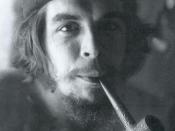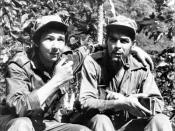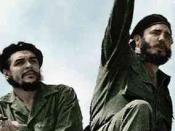Both during and after the actual revolution in Cuba, Che Guevara played roles of major importance to the revolution itself. One's importance to anything is always relative and difficult to quantify. Compared to Fidel Castro, Guevara was only in a supporting role while Castro had the limelight, but he was not forgotten. However, compared to the citizens of Cuba, Guevara was one of the people that made the continuation of the revolution possible.
Fidel Castro believed that one of the ways to win over the citizens of Cuba immediately after the revolution was through the media; and he placed Guevara in charge of the state new agency. This shows how much trust Castro placed on Guevara and also his relative importance at that stage of the revolution; he was responsible for convincing the people of the merits of the revolution and the new government.
Guevara was in charge of the National Bank of Cuba for several years and was also responsible for making economic policies and creating machinery for industrialisation of the new state.
He represented Cuba visiting many countries including the USSR and China. These experiences shaped his economic policies towards imitating the USSR with industrialisation. However, in reality, they were failed plans. Guevara was pivotal to Cuba's economic developments immediately after Castro took power.
Guevara continued modelling Cuba after the USSR when he became Minister of Industry in 1961. Guevara realised his economic mistakes and made a formal break with the USSR in 1965, however, officially, Cuban and the USSR were still very much associated, and thus Guevara also made a break from Cuba and Castro. At this stage, he is no longer a major figure in the Cuban government and is not regarded as important by Castro, however, because of what he did in previous years,



Awesome
i like this one
0 out of 0 people found this comment useful.